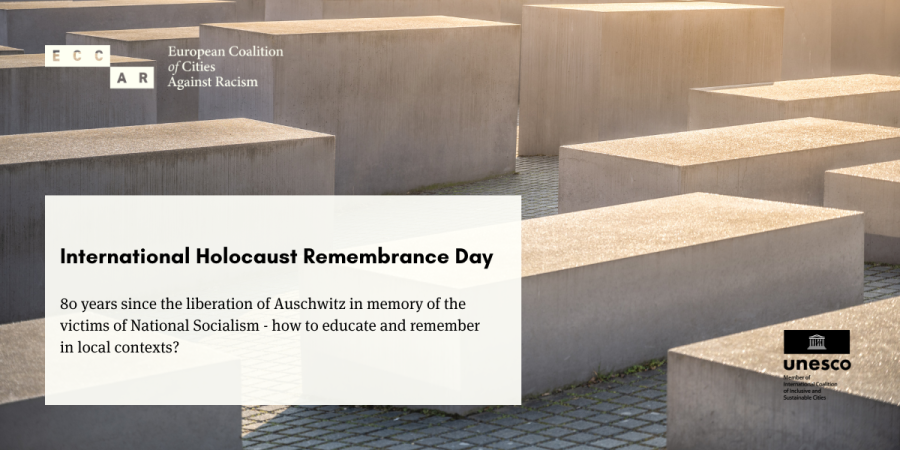
This year, we commemorate the 80th anniversary of the liberation of Auschwitz in 1945. The 27 January 2025, International Holocaust Remembrance Day, thus underscores the enduring significance of remembrance. It is a moment to reflect on the horrors faced by Jews, who were persecuted and murdered during the Holocaust, alongside other victim groups such as Roma and Sinti, people with disabilities, LGBTQ+ individuals, political dissidents, and many others. As time progresses, the voices of survivors and witnesses grow fainter, highlighting the urgent need for cities to find innovative ways to honour their experiences and educate future generations.
By joining ECCAR, cities commit to the ECCAR 10 Points Action Plan, which also emphasises a firm commitment to challenging racism and discrimination through education and promoting cultural diversity. ECCAR has intensively worked with organisations such as the CEJI and the AEPJ to provide ECCAR member cities with appropriate capacity-building activities in combating antisemitism and fostering Jewish life. Cities have so far benefited from an online workshop on hate speech, targeted on-site training in Brussels, Nice, and Bologna, and storytelling.
To foster an environment of mutual tolerance and understanding, cities should prioritise educational initiatives that embrace intercultural dialogue, with Holocaust remembrance as a central theme. Developing teaching materials—such as textbooks, guides, audiovisual resources, and comprehensive kits—should speak to human dignity and peaceful coexistence and provide poignant context by incorporating the narratives of Holocaust victims of all groups and witnesses from the local area.
Additionally, cities can finance educational excursions to concentration camps for children and teenagers, offering firsthand insights into the past. Collaboration among schools, museums, and organisations focused on non-formal education is vital for addressing the complexities of the Holocaust and genocide. Ensuring that children, youth and adults receive appropriate knowledge of the Holocaust and its local, regional, and national history, modes of cooperation can include human rights education programs, engaging exhibitions, guided city tours exploring local “Stolpersteine,” or integrating Holocaust research into the broader historical narratives in municipal archives related to the National Socialist era.
Furthermore, recognising the importance of adequately trained teaching staff, cities can provide professional development opportunities, collaborating with Jewish and Roma communities and cultural institutions to enhance educators' knowledge and proficiency in presenting the complexities of the Holocaust and genocide.
To promote cultural diversity and sustain Holocaust remembrance and education, cities can also play a crucial role by naming public spaces—such as streets, squares, and monuments—after local citizens from communities who were victims of the Holocaust. These commemorative actions not only pay tribute to their contributions to safeguarding humanity but also weave their legacy into the collective memory and identity of the city.
Additionally, highlighting the narratives of all victim groups can deepen our comprehension of Nazi persecution from an intersectional perspective. At the same time, educating residents about the importance of civil courage remains vital, especially in contemporary contexts where extreme-right ideologies, hate, and racism are on the rise and antisemitism is widespread. Designated memorial sites honouring those local residents who bravely intervened to save Jewish citizens and other targets of Nazi persecution during the Holocaust serve as powerful reminders of the impact of courageous actions in the face of adversity. By confronting the harrowing realities of this dark chapter in history and recognising its lasting impact on Jewish communities today, cities can work towards diminishing antisemitic attitudes in society.
